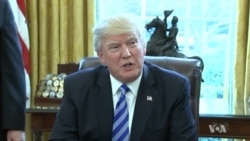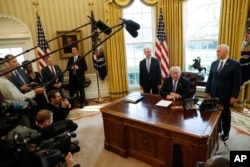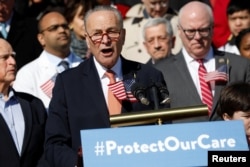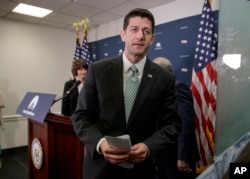The Trump administration has resumed efforts at getting divided congressional Republicans to agree on a replacement for former President Barack Obama's signature health care law.
Last month's failure to pass a replacement health care law exposed divisions among Republicans in Washington, but any attempt by President Donald Trump to reach out to opposition Democrats also carries risks.
Targeting House conservatives
Last month, the White House pulled a health care replacement bill when it became clear that too many conservative House members of the Freedom Caucus opposed the measure.
The resistance stood even after the president met with several House members opposed to the bill. "They are friends of mine. I'm disappointed because we could have had it. So, I'm disappointed," Trump told reporters in the Oval Office on the day the health care measure failed.
But the president seemed to get angrier as time went by, and on March 30 he spoke out against conservatives who opposed him. "The Freedom Caucus will hurt the entire Republican agenda if they don't get on the team, & fast," Trump said on Twitter. "We must fight them, & Dems, in 2018!"
A Turn to Democrats?
Trump raised the possibility of turning to Democrats if some Republicans continue to oppose him. "If they got together with us and got a real health care bill, I would be totally open to it, and I think that is going to happen," he said.
But Democrats, including House Democratic leader Nancy Pelosi, expressed little interest.
"They are going to try to put repeal [of Obamacare] on the table [for consideration]," Pelosi told reporters at the Capitol. "We must resist repeal. There is a strong sentiment for that in the country."
Senate Democratic leader Chuck Schumer added a more ominous note this week in an exchange with reporters.
"Trump is going to have problems until he learns that the only way to get things done in this place, even though he has the majority in the House and Senate, is in a bipartisan way," Schumer said. "If he doesn't, his presidency will be a disaster."
Republican risks
However, any move by Trump toward engaging Democrats could spark angst among Republicans.
"If we are going to do what we said we were going to do, which is repeal and replace Obamacare and save the American health care system, something tells me the Democrats are not going to help us repeal Obamacare," said Republican House Speaker Paul Ryan. "They are the ones who created it in the first place."
Vice President Mike Pence is working to win over some members of the Freedom Caucus, but many insist they will stick to their principle of minimal government involvement in health care.
"Do we need to lower the bar in what we believe as conservatives simply because a Republican is now in the White House?" asked South Carolina Representative Mark Sanford.
Weak poll position
Trump's position in public opinion polls could limit his political leverage. The latest Quinnipiac University poll gave the president an approval rating of 35 percent, while 57 percent disapproved of his performance in office so far.
Quinnipiac's assistant polling director, Tim Malloy, issued a statement that the president "continues to struggle even among his most loyal supporters." Malloy added that many of his backers would be "hard pressed to see even a sliver of a silver lining in this troubling downward spiral."
Some analysts have warned that Trump's focus on catering to his political base and working around Democrats could limit his success.
"Mr. Trump's problem was that he started off with a divided electorate and relatively low approval ratings, and they have bumped up and down but appear to be on a downward path now and this will make his job of governing more difficult," said Brookings Institution scholar William Galston.
A new approach
A different approach from the president is needed for a revival of the health care effort, according to Republican strategist John Feehery.
"For this president to be successful, he's going to have to do more than paint in broad brushes," Feehery said. "He is going to have to get into the nitty-gritty and help the Congress to completion on these things because, frankly, you have to have the president resolve these disagreements."
Feehery also cautions that congressional conservatives could limit Trump's ability to work with Democrats. "This is going to be a challenge for him," he said. "If he makes the Democrats the enemy, it is going to be very difficult for him to get anything done."









